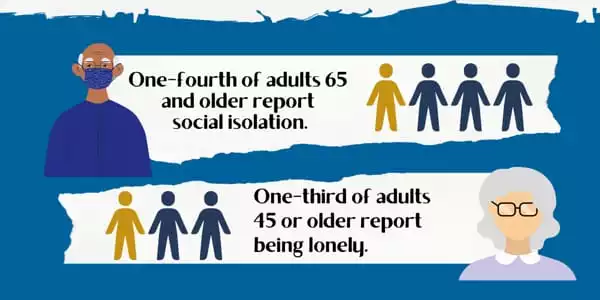Social isolation increased a person’s risk of dying prematurely from any cause, a risk that may rival that of smoking, obesity, and physical inactivity. Social isolation was found to be associated with a 50% increase in dementia risk.
Loneliness is thought to contribute to cognitive decline via a variety of mechanisms, including physical inactivity, depressive symptoms, poor sleep, and elevated blood pressure and inflammation. Loneliness has also been linked to a 20% increase in the risk of dementia. According to new research, postmenopausal women who experience high levels of social isolation and loneliness are at a 27 percent increased risk of developing heart disease.
During the current pandemic, one tool used to combat COVID-19 spread has been social distancing. A new study, however, suggests that postmenopausal women who experience both high levels of social isolation and loneliness are at a 27 percent increased risk of heart disease.
The findings of the prospective study, published in the online issue of JAMA Network Open, show that social isolation and loneliness both increased the risk of cardiovascular disease by 8% and 5%, respectively. Women who reported high levels of both increased their risk by 13% to 27% compared to women who reported low levels of social isolation and loneliness.
Physically being away from people, such as not touching, seeing, or talking to them, is an example of social isolation. Obesity, smoking, physical inactivity, poor diet, high blood pressure, and high cholesterol are all associated with social isolation and loneliness, which are linked to health conditions that increase the risk of cardiovascular disease.
John Bellettiere
“We are social creatures. Many people are experiencing social isolation and loneliness during COVID-19, which can lead to chronic conditions” Natalie Golaszewski, Ph.D., a postdoctoral scholar at the Herbert Wertheim School of Public Health and Human Longevity Science at the University of California San Diego, is the study’s first author. “It is critical to learn more about the short- and long-term effects of these experiences on cardiovascular health and overall well-being.”
Importantly, while social isolation and loneliness are mildly related and can occur concurrently, they are not mutually exclusive. A person who is socially isolated is not always lonely, and vice versa, a person who is lonely is not always socially isolated.
“Physically being away from people, such as not touching, seeing, or talking to them, is an example of social isolation. Loneliness is a feeling that can be felt even by people who are constantly in contact with others” John Bellettiere, Ph.D., M.P.H., assistant professor of epidemiology at the Herbert Wertheim School of Public Health, is the study’s senior author.
Obesity, smoking, physical inactivity, poor diet, high blood pressure, and high cholesterol are all associated with social isolation and loneliness, which are linked to health conditions that increase the risk of cardiovascular disease.

When researchers included all of these health behaviors and conditions in their study and controlled for diabetes and depression, high social isolation and loneliness remained strongly associated with an increased risk of heart disease, demonstrating the importance of studying these social conditions.
Heart disease is the leading cause of death for women in the United States, accounting for one out of every five deaths, according to the Centers for Disease Control and Prevention. According to the authors, as social networks shrink, older adults are more vulnerable to social isolation and loneliness. One-fourth of adults aged 65 and up report social isolation, while one-third of adults aged 45 and up report loneliness.
“We do not yet know whether the increased risk of cardiovascular disease is caused by acute social isolation and loneliness or by chronic exposure accumulated over a lifetime. More research is needed to better understand this” Bellettiere stated.
Previous research indicates that women are more socially isolated than men. From 2011 to 2012, 57,825 postmenopausal women in the United States who had previously participated in the Women’s Health Initiative study completed questionnaires assessing social isolation. In 2014 and 2015, they were sent a second questionnaire to assess loneliness and social support.
Participants were tracked from the time they completed the questionnaire until 2019, or until they were diagnosed with cardiovascular disease. A total of 1,599 women were diagnosed with cardiovascular disease.
“Measures of social isolation and loneliness, even with brief questions like those used in our study,” Golaszewski said, “should be incorporated into standard care. We monitor our patients’ blood pressure, weight, and temperature, and it may be useful to capture the social needs that individuals may be lacking in order to better understand cardiovascular risk and develop solutions.”
Individuals who are lonely or socially isolated can find information from the National Institute on Aging on how to reduce these feelings.














